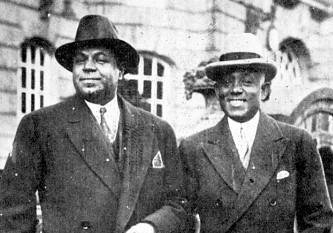The eventful life of singer and composer Turner Layton
Turner Layton was a great black singer, pianist and composer, who lived in Aberdare Gardens from the 1930s to 1978.
He was born John Turner Layton Jr. on 2 July 1894 in Washington D.C., the son of a singer, hymn composer and director of music at a local school. In 1915 John married Emma Lee and they had a daughter. John was studying at Howard University dental school when his father died in November 1916. There was no money to continue paying the fees and the family moved to New York. Here John began to sing and play the piano to make a living.
In 1917 he teamed up with Henry Creamer, who wrote the lyrics for the music Layton composed. They achieved success with some of the most popular songs of the day including; ‘Way Down Yonder in New Orleans’ and ‘After You’ve Gone’ which became a million selling record for Sophie Tucker in 1918.
https://www.youtube.com/watch?v=fAuCSSLC-bk
Layton wrote songs for stars such as Al Jolson and Eddie Cantor and made his own first recording in 1921 for the Black Swan label.
In 1922 he formed a double act with Clarence Johnstone and they achieved considerable success when Layton played piano and they both sang. Layton and Johnstone performed in Harlem and were in demand for society events, including parties held by the Astors and Vanderbilts. They showed a more refined musical technique than most other black artists of the time and when Lord and Lady Mountbatten heard them sing, they suggested Layton and Johnstone should try their luck in England.

Turner Layton (l) and Clarence Johnstone (r) in 1933
In May 1924 they opened at London’s Queen’s Theatre, in the revue ‘Elsie Janis at Home.’ They were an overnight success, partly because Edward, Prince of Wales raved about their performance and engaged them to play for his guests at St James Palace. Soon all of Britain wanted to see Layton and Johnstone. After topping the bill across the country, they decided to stay in England. The duo made more than a 1,000 recordings with sales exceeding 10 million records. Their BBC radio appearances meant they were equally popular at exclusive West End clubs such as the Café de Paris as in music halls such as the Hackney Empire, where they played to full houses. They were also popular in Europe and played in Berlin and Paris.
In the early 1930s, Clarence Johnstone had an affair with a married white woman. Raymonde Sandler was the wife of Albert Sandler, violinist and leader of the orchestra at the Park Lane Hotel. The Sandlers lived at 233 Goldhurst Terrace until they parted in March 1933.
Johnstone had signed a letter for Albert Sandler in May 1932 saying that he would leave Raymonde alone and giving his word that he would not see her again. But Sandler was later given evidence by Johnstone’s chauffeur of the dates when they had met. The public turned against Johnstone after the high profile divorce in 1934, when he was ordered to pay damages of £2,500.
Even though he married Raymonde in December 1935, bookings were cancelled and Layton and Johnstone faced demonstrations outside theatres they were playing.
Layton decided they had to dissolve the partnership and Johnstone was declared bankrupt in 1936. During the hearings it was revealed that between 1928 and 1935 they each had annual earnings of £64,000 worth about £3.5 million today. Johnstone had frittered his money away. In 1931 when his flat at Castelain Mansions, Maida Vale was burgled, it was reported he lost furs, a large diamond pendant, a diamond ring plus a platinum and diamond watch worth more than £6,000. After the divorce case, Johnstone and Raymonde returned to America, but he failed to revive his career and ended up working as a janitor. In 1939 he broke down and spent some time in a sanatorium. Raymonde divorced him and later remarried.
In contrast, Turner Layton continued to both work and tour successfully, from 1936 to the 1950s. He appeared in several films and during WWII he boosted troop morale with concerts and recordings. He retired soon after being the guest on Desert Island Discs in 1956. Layton’s description by a record executive as ‘a cultured fellow and a collector of early Augustus John drawings,’ was echoed by a friend who said he was, ‘a modest, soft spoken, and quiet individual – genteel, polished and cultivated.’
Turner Layton lived at 77 Aberdare Gardens and died at the Royal Free Hospital on 6 February 1978. His daughter A’Lelia Shirley Layton inherited his musical estate and left the copyright and royalties to Great Ormond Street. In the 1993 BBC Radio 4 play ‘After You’ve Gone,’ Layton was played by Clarke Peters and Lenny Henry took the part of Johnstone.
You can hear Layton’s wonderfully smooth tone singing ‘Deep Purple’ and ‘A Nightingale Sang in Berkeley Square’.



Pingback:Layton & Johnston – 1929 | Dismuke's 78 RPM Blog
Thank you so much for this wonderful article – although I was very young at the time it has brought back beautiful memories. I will share this with my daughters who are always interested in their grandma’s life.
I never knew what happened to Johnstone – how very sad. I also didn’t know Layton’s royalties went to Great Ormond Street – how fantastic .